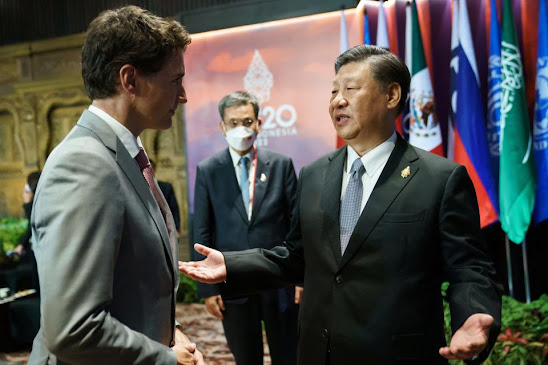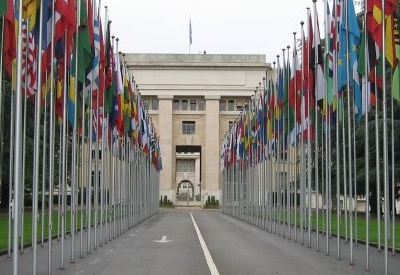The Canadian government is trying to make up for lost time against an imposing China. Can it succeed?
The Trudeau government announced a new White Paper on China regarding Ottawa’s foreign-policy outlining China as a "disruptive" threat to Canada and democracy. The paper talks about cyber security and strengthening Canada‘s position in the Indo- Pacific vis-à-vis naval assets and military support. Also, there is the desire to build a stronger alliances regarding trade and monetary influence to those regional partners in Southeast Asia. The nexus of the internal approach is to work with democracies in the Indo- Pacific to counter China’s growing influence, but, also within Canada. Now, there seems to be little attention given to Ottawa’s domestic policies regarding China. This is of significant importance as exports to China from Canada need to be expanded. StatsCan has reported these results for the second quarter of 2022, that indicate China’s almost 15% reduction in Canadian imports. Fortunately, the Canadian traders have practically made up for the difference in the drop in Canadian exports to China.
The above chart, once again from STATSCAN indicates Chinese imports into Canada were plus 18.96% for the first six months of 2022. Therefore, it is no surprise that China is pushing their way around Canadian policies regarding Canadian internal matters. Recently, Prime Minister Trudeau indicated a problem regarding Chinese interference in Canadian elections. Dialogue between Trudeau and Xi Jinping at the recent G20 meetings and Xi‘s apparent scolding of Trudeau is good fodder for the media and excellent motivation for the Prime Minister to counter with the release of this new white paper. The real crux of the matter, and it is an internal one for Canadian legislators to deal with, is how to develop a Canadian economy that services Canadians, first and foremost. Justin Trudeau’s immigration plan is to increase immigration numbers by 1.2 million people by 2025. There is no doubt that an ageing population and lack of Canadians having families has contributed to the governments immigration policy. However, after almost 30 years of political negligence regarding Canadian jobs beginning with free trade introduced by the Progressive Conservative Brian Mulroney government in 1988 with FTA (Free Trade Agreement.) the Canadian government followed that up with NAFTA in 1993 that expanded free trade from the United States into Mexico. In the aftermath of FTA and NAFTA, the CBC reported ”…American investment in Canada increased and Canadian imports and exports to the United States more than doubled between 1990 and 1997. Critics contend that free trade resulted in a loss of 250,000 jobs by 1992 with the sale of Canadian companies or their movement to the United States or Mexico.” There is no denying the benefits of free trade as those numbers show, still, more needs to be done to protect Canadian workers and foster industrial growth within Canada. Now is the time to start expanding industry in Canada for Canadians. There is a promised by the Canadian government to provide 7.5 million within the province of Saskatchewan to mine, these rare earth elements (REE.) Canada should be leading REE, internationally with its mining prowess from coast to coast to coast. China is leading in R.E.E. through excavation, research, and industrial exports, this investment by the Canadian government provides a good opportunity for Canada to limit China’s reach and influence on Canadian rare earth materials and Canadian structural influence on the Canadian economy. This will be a timely moment to take a protectionist approach for Canadian jobs and industry that has been missing. After the Mulroney - Campbell government was voted out of office in 1993 and the Liberal Party assumed power, the Jean Christian Liberal Party embarked on a pro China trade relationship that has continued to the present at the detriment of the Canadian worker.
"In August 2022, Canada exported C$49.2B and imported C$31.8B from United States, resulting in a positive trade balance of C$17.4B." OEC - Observer for Economic Complexity
https://oec.world/en/resources/about
Canada‘s reliance on the U.S. for trade has gotten too unilateral similarly to China, although export driven. However, China’s totalitarian approach to the international community and its well regarded “wolf warrior“ approach to diplomacy with countries that are weaker than they are regarding trade are well documented. These include the absence of human rights, and most recently, for Canada involved the abduction and hostage diplomacy regarding Canadians – Michael Kovrig and Michael Spavor. It was not a coincidence that both of these Canadian hostages at the hands of Chinese officials were released after the US and China made an agreement to release and drop charges to Meng Wanzhou - Huawei executive, who was guilty of circumventing trade sanctions with Iran. So, while we are tied to the United States regarding extradition treaties for individuals that run afoul of American authorities, as direct neighbours of the United States - share the longest border in the world, Canada is beholden to requests by the United States regarding extradition requests.
The Canadian government must tackle internal matters that threaten Canadians such as the Chinese installation of, what boils down to are China sponsored police stations(that are popping up in urban areas in Canada/2 in Toronto etc.) that undermine Canadian law-enforcement officials such as provincial and national security forces. That has to change in the Prime Minister’s Office as the Canadian government needs to tackle with vigilance in order to back up their new foreign policy for the Indo Pacific. Moreover, despite China’s overall greater strength in Canada, Canadian legislators need to act now to influence democratic partners, including those from the G7, G20, NATO, and the United Nations.
The expected response from Chinese officials to this shift in foreign policy from the Trudeau government will likely be indifference. The risk for the Trudeau government domestically is that opposition parties will see this as an opportunity against an out of touch government failing to restrict the reach of a belligerent China. In addition, to counter China’s belligerence within Canada that has been growing significantly since the beginning of the Xi Jinping era, Canadian opposition parties can augment their foreign policy around the weakness of the Liberal Party’s track record regarding scandals, large deficits, a national housing crisis and high inflation.
The opposition Conservative Party of Canada under the leadership of new leader, Pierre Poilivre, will provide an opportunity to showcase him as a stronger force for Canadians than they appear to have been getting from Justin Trudeau since his election as Prime Minister of Canada in 2015. However, if Trudeau’s government can rise to the challenge and introduce policies that limit in a measurable way China’s influence in Canada, this will help their electoral prospects in 2025, or sooner, if the liberal minority government is defeated. China’s own internal discord with its zero Covid policy and faltering economy(OECD estimates growth at 3.3% in 2022) will have an impact on the central government’s ambitions to strengthen Chinese influence internationally. The Liberal White Paper lacks specific solutions to pressing issues that seem too formidable for this government to address as under successive mandates, they lacked the focus, understanding, and desire to manage the China file.








